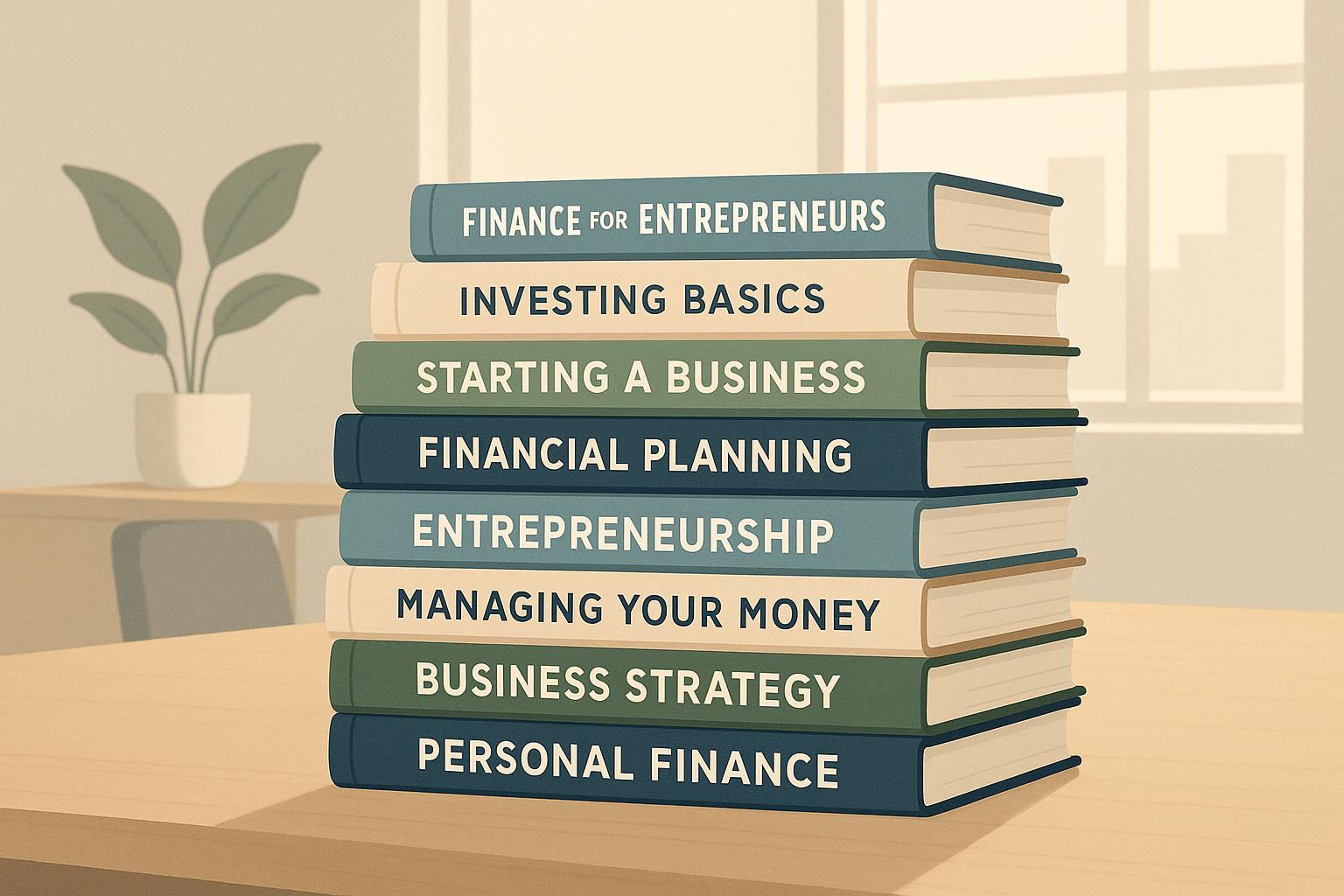Want to thrive in business under pressure? Mental toughness is the key. It helps you stay calm, adapt to challenges, and make smart decisions. These 7 books provide actionable strategies to sharpen your resilience, focus, and mindset:
- Can't Hurt Me by David Goggins: Push past limits and build resilience through real-life lessons and exercises.
- Atomic Habits by James Clear: Learn how small, consistent habits lead to big results with practical habit-forming techniques.
- The Obstacle Is the Way by Ryan Holiday: Use Stoic philosophy to turn challenges into opportunities.
- Grit by Angela Duckworth: Combine passion and perseverance to achieve long-term success.
- Mindset by Carol S. Dweck: Shift to a growth mindset to embrace challenges and learn from failures.
- The Hard Thing About Hard Things by Ben Horowitz: Navigate tough business decisions with real-world advice.
- Deep Work by Cal Newport: Master distraction-free focus to boost productivity and tackle complex problems.
Quick Comparison Table:
| Book Title | Core Focus | Key Takeaway | Best For |
|---|---|---|---|
| Can't Hurt Me | Resilience | Push past mental barriers | Entrepreneurs facing challenges |
| Atomic Habits | Habit Formation | Build habits with small, consistent changes | Those seeking productivity gains |
| The Obstacle Is the Way | Stoic Philosophy | Turn obstacles into opportunities | Leaders managing setbacks |
| Grit | Passion & Perseverance | Success comes from consistent effort | Long-term goal seekers |
| Mindset | Growth vs. Fixed Mindset | View challenges as learning opportunities | Personal and team growth |
| The Hard Thing About Hard Things | Tough Decisions | Practical advice for business crises | Entrepreneurs in high-pressure roles |
| Deep Work | Focused Productivity | Achieve more with intense focus | Professionals battling distractions |
These books offer practical steps to strengthen your mental toughness, whether you're building habits, managing stress, or leading under pressure. Start with the one that fits your current challenge and take action today!
9 Mental Toughness Exercises for Business Owners
Mental Toughness in Business: Key Elements
Mental toughness combines resilience, flexibility, and strategic thinking to help entrepreneurs succeed in challenging environments. These traits are crucial for making tough decisions and navigating unpredictable markets.
It is built on three main pillars:
-
Resilience Under Pressure
- Staying calm during negotiations
- Handling uncertainties with composure
- Making clear, confident decisions
-
Flexibility in Uncertainty
- Adjusting strategies quickly
- Thinking creatively when plans fall apart
- Finding solutions during tough times
-
Strategic Decision-Making
- Keeping emotions in check
- Staying objective in high-pressure situations
- Balancing risks and rewards effectively
| Mental Toughness Component | Business Impact | Key Development Area |
|---|---|---|
| Emotional Control | Stronger team leadership | Stress management methods |
| Focus & Concentration | Improved productivity | Deep focus techniques |
| Growth Mindset | Consistent improvement | Learning from failures |
| Resilience | Long-term sustainability | Recovery strategies |
Building mental toughness takes consistent effort. Simple habits, like daily mindfulness exercises, can boost resilience. Stress management techniques are invaluable for dealing with challenges like team disputes or market fluctuations. Additionally, having a network of mentors and peers provides critical support during tough times.
Leaders with mental toughness not only improve their own performance but also strengthen their teams and organizations. They create businesses that can handle market shocks and emerge stronger.
To develop this skill, focus on:
- Enhancing emotional intelligence
- Increasing stress tolerance
- Creating structured decision-making processes
- Implementing recovery strategies
Mental toughness is the bedrock of effective leadership, innovation, and planning. Strengthening this quality helps entrepreneurs manage complexity while staying productive and maintaining their well-being.
These principles set the stage for the mental strategies explored in the following book reviews.
1. Can't Hurt Me by David Goggins
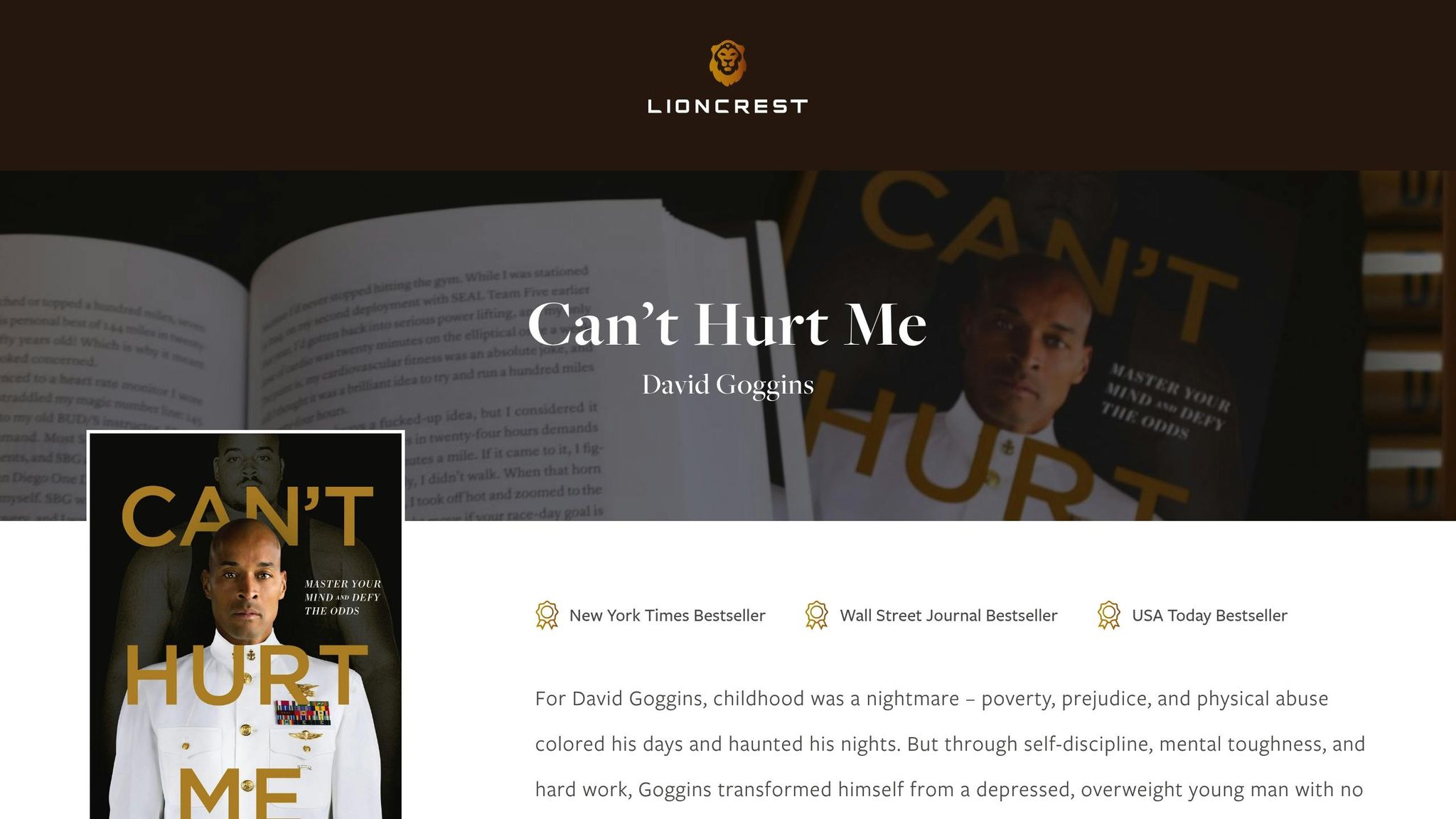
David Goggins' memoir, Can't Hurt Me, dives into the concept of resilience by sharing his own life experiences. It's packed with lessons that entrepreneurs can apply to navigate challenges and stay persistent.
The book includes practical exercises designed to help readers strengthen their mental endurance and maintain focus under pressure. Goggins emphasizes the importance of pushing past limits and fostering a mindset geared toward growth - skills that are crucial for thriving in today's competitive business world.
2. Atomic Habits by James Clear
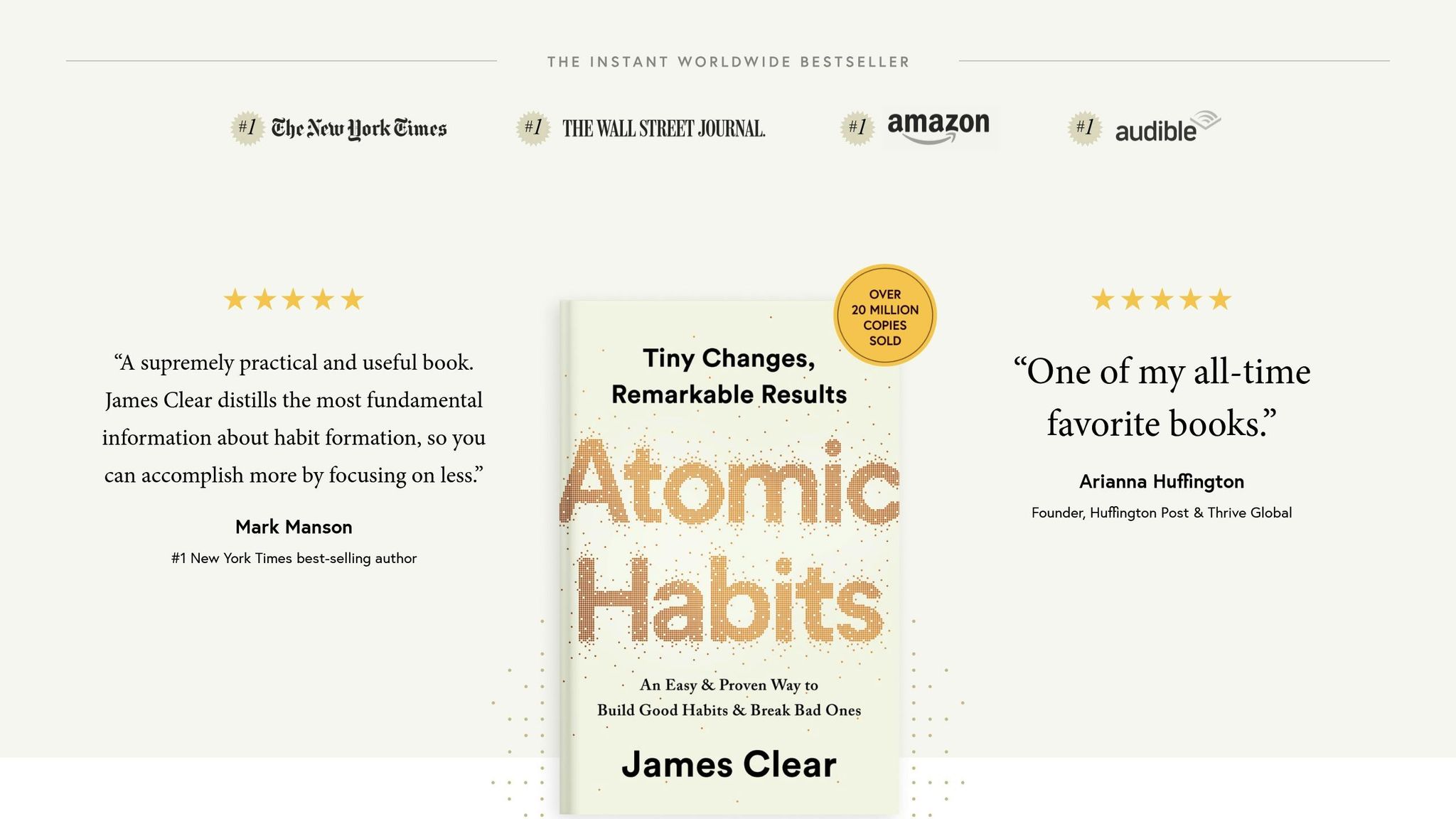
James Clear's Atomic Habits offers a straightforward guide to building mental resilience through small, consistent changes. The main idea? Focus on getting just 1% better each day. Over time, these tiny improvements add up to major gains in both personal growth and business performance.
The book outlines the "Four Laws of Behavior Change", a framework for creating habits that stick:
- Make it Obvious: Set up clear cues in your environment for positive habits.
- Make it Attractive: Pair challenging tasks with enjoyable activities.
- Make it Easy: Simplify processes to reduce barriers.
- Make it Satisfying: Reward yourself immediately to reinforce progress.
Instead of obsessing over goals like "boost revenue by 50%", Clear encourages focusing on daily systems and routines. By doing so, you build habits that naturally lead to your desired outcomes, even when immediate results aren’t visible.
The book also introduces habit stacking, a method where new habits are tied to existing ones. Here’s how it works:
| Current Habit | New Habit Stack | Business Benefit |
|---|---|---|
| Morning coffee | Review key metrics | Better data-driven decisions |
| Team check-in | Practice active listening | Stronger leadership skills |
| Checking email | Strategic planning session | More effective time use |
To kick bad habits, Clear suggests making them invisible, unattractive, difficult, and unsatisfying. This method helps eliminate behaviors that might derail your progress.
Tracking your habits regularly is another key takeaway. By doing this, you stay aware, hold yourself accountable, and build the consistency needed for lasting success.
Clear’s practical approach to habit-building lays the groundwork for exploring more strategies on resilience in the sections ahead.
3. The Obstacle Is the Way by Ryan Holiday
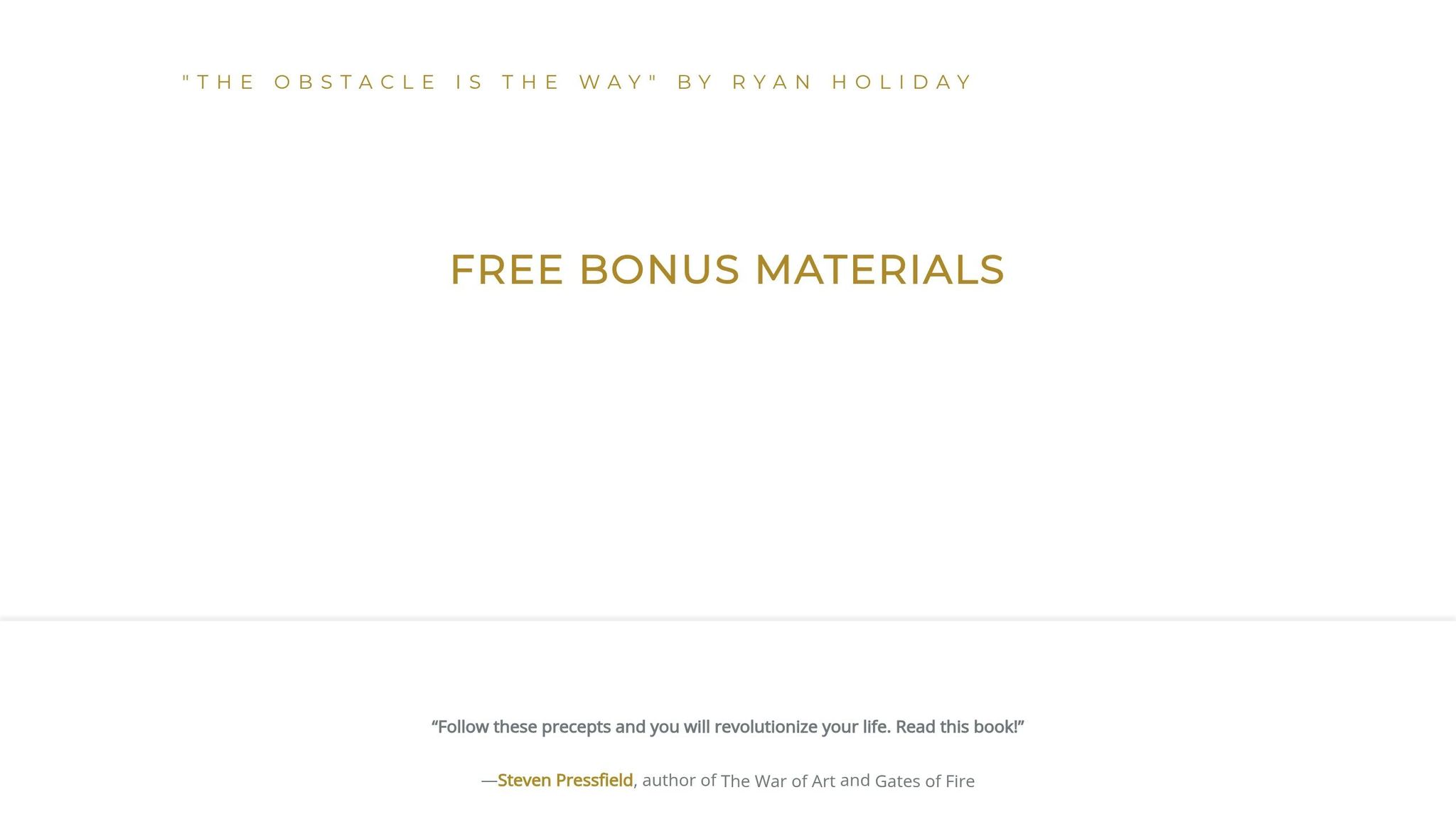
Ryan Holiday's book brings the ancient philosophy of Stoicism into the modern world of business. At its core, the message is straightforward: obstacles can be turned into opportunities.
Holiday breaks mental toughness into three key components:
-
Perception
The way we see challenges directly affects how we handle them. To approach problems objectively:
- Separate emotions from facts
- Look for opportunities hidden within setbacks
- Stay calm, even under pressure
-
Action
Once perception is managed, the next step is intentional action:
- Break big challenges into smaller, doable tasks
- Focus on what’s within your control
- Keep moving forward, no matter the circumstances
-
Will
Strengthen resilience by:
- Practicing mental discipline regularly
- Accepting what can’t be changed
- Using setbacks as a chance to grow
These principles form the backbone of the mental toughness needed in business. Here's how Stoic tactics can be applied:
| Challenge Type | Stoic Tactic | Business Application |
|---|---|---|
| Market Setbacks | Study market signals | Adjust products or services based on feedback |
| Competition | Analyze market demand | Define what sets you apart |
| Resource Limitations | Work within constraints | Develop creative, lean solutions |
Holiday emphasizes that mental toughness is all about how we respond to challenges. This mindset is especially helpful for:
- Startup founders grappling with uncertainty
- Leaders navigating organizational change
- Professionals undergoing career transitions
"The obstacle in the path becomes the path. Never forget, within every obstacle is an opportunity to improve our condition."
- Ryan Holiday
This philosophy ties seamlessly into the habit-focused strategies discussed earlier. Up next, another book offers a fresh take on building resilience.
4. Grit by Angela Duckworth
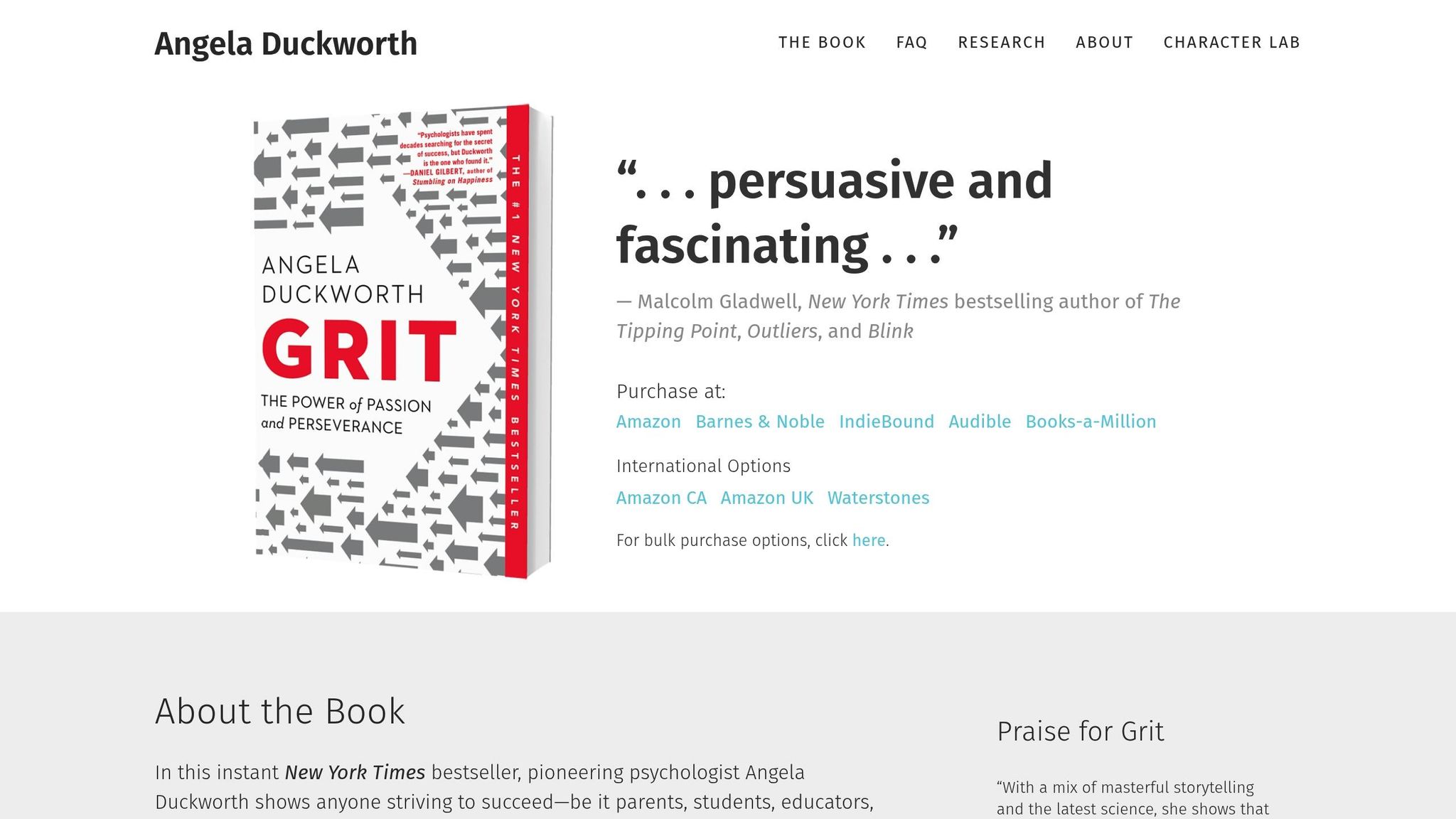
Angela Duckworth describes grit as the combination of passion and perseverance that fuels long-term success. According to her, grit - not just talent or IQ - is a key factor in thriving within demanding business environments. It complements the idea that steady, consistent effort is essential for overcoming challenges in business.
The book breaks grit into practical components that entrepreneurs can cultivate:
| Component | Business Application | Development Strategy |
|---|---|---|
| Passion | Commitment to long-term business goals | Identify key interests and align them with objectives |
| Perseverance | Tackling market challenges | Break obstacles into smaller, actionable steps |
| Purpose | Connecting work to a larger mission | Link daily tasks to a bigger business impact |
| Practice | Building and refining skills | Focus on deliberate improvement in critical areas |
For entrepreneurs, grit helps turn obstacles into opportunities to learn and grow. Here's how:
- Market Setbacks: Grit shifts the perspective on failures, treating them as temporary setbacks. This mindset is especially helpful during product launches, economic downturns, or shifts in competition.
- Strategic Planning: It encourages leaders to divide big goals into smaller milestones, persist through challenges, and adapt strategies while staying focused on the ultimate objective.
- Team Development: Grit fosters resilient teams by promoting a culture where failures are seen as lessons and skill improvement is a continuous process.
"Grit is about having stamina, sticking with your future, day in, day out, not just for the week, not just for the month, but for years"
Duckworth's insights align well with other strategies for mental toughness, offering a clear framework for staying focused and resilient through consistent daily efforts.
sbb-itb-1ae7b2a
5. Mindset: The New Psychology of Success by Carol S. Dweck
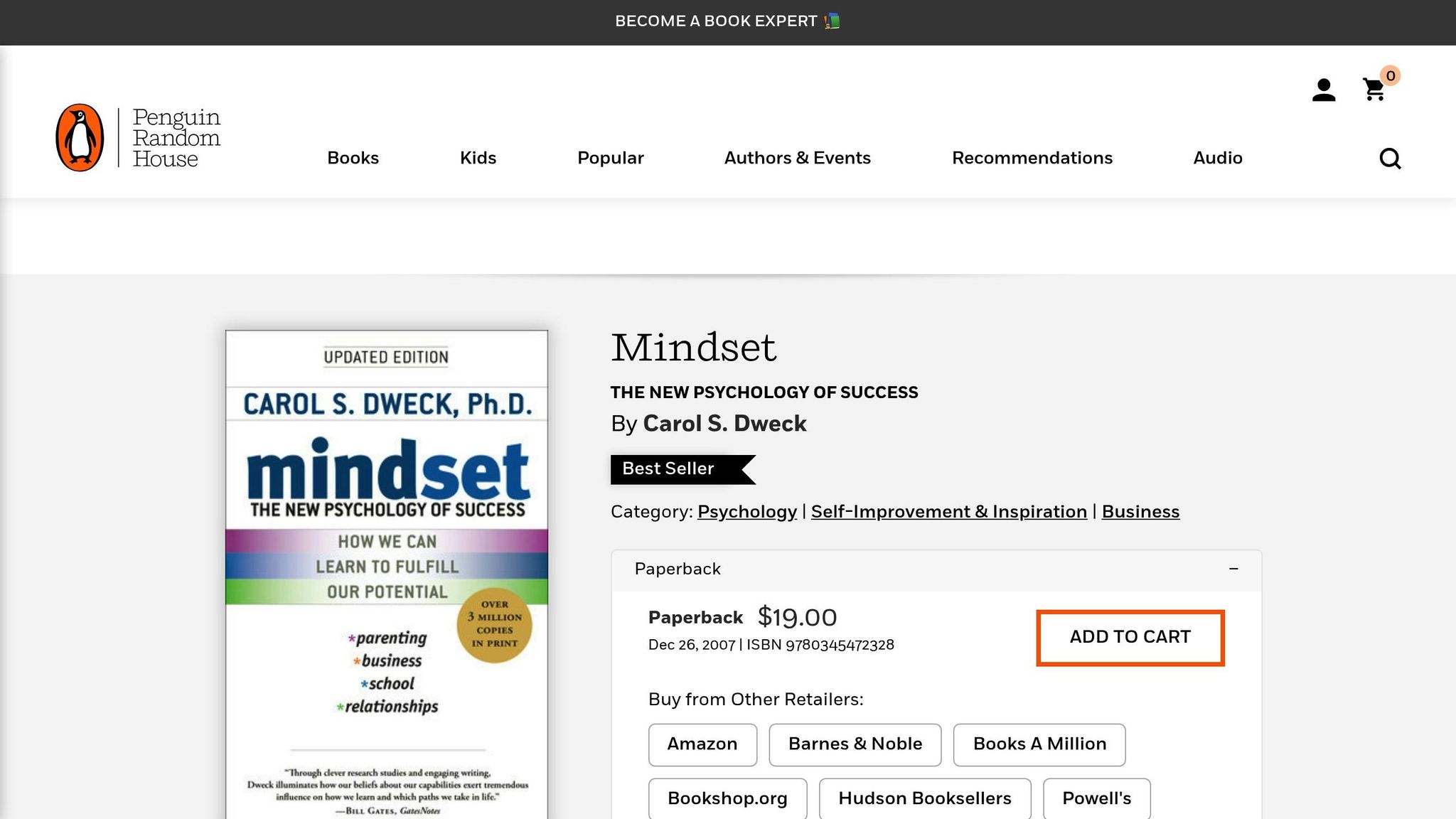
Carol S. Dweck's research introduces a powerful framework for mental resilience, complementing the concept of grit. Her work emphasizes how shifting one's mindset can improve an entrepreneur's ability to tackle challenges effectively. This perspective lays the groundwork for practical strategies that strengthen resilience in business.
| Mindset Type | Business Impact | Resulting Behaviors |
|---|---|---|
| Fixed Mindset | Avoids challenges and gives up easily | Views failures as personal flaws and feels threatened by others' successes |
| Growth Mindset | Embraces challenges and persists | Treats failures as learning opportunities and draws inspiration from others' wins |
Adopting a growth mindset helps leaders manage market uncertainties and competitive pressures. It builds mental resilience by focusing on:
- Facing Challenges: Viewing tough situations as chances to grow and develop new skills.
- Learning from Feedback: Treating criticism as a tool for improvement.
- Ongoing Development: Prioritizing skill-building and long-term growth over immediate results.
- Valuing Effort: Understanding that consistent effort, rather than innate ability, drives success.
To create a resilient team culture, consider these approaches:
- Reward effort and creative problem-solving, not just final outcomes.
- Support experimentation and treat failures as learning opportunities.
- Offer feedback that highlights areas for improvement.
- Celebrate milestones and small successes to maintain motivation.
These strategies equip entrepreneurs with the mental strength needed to handle the complexities of today's business landscape.
6. The Hard Thing About Hard Things by Ben Horowitz
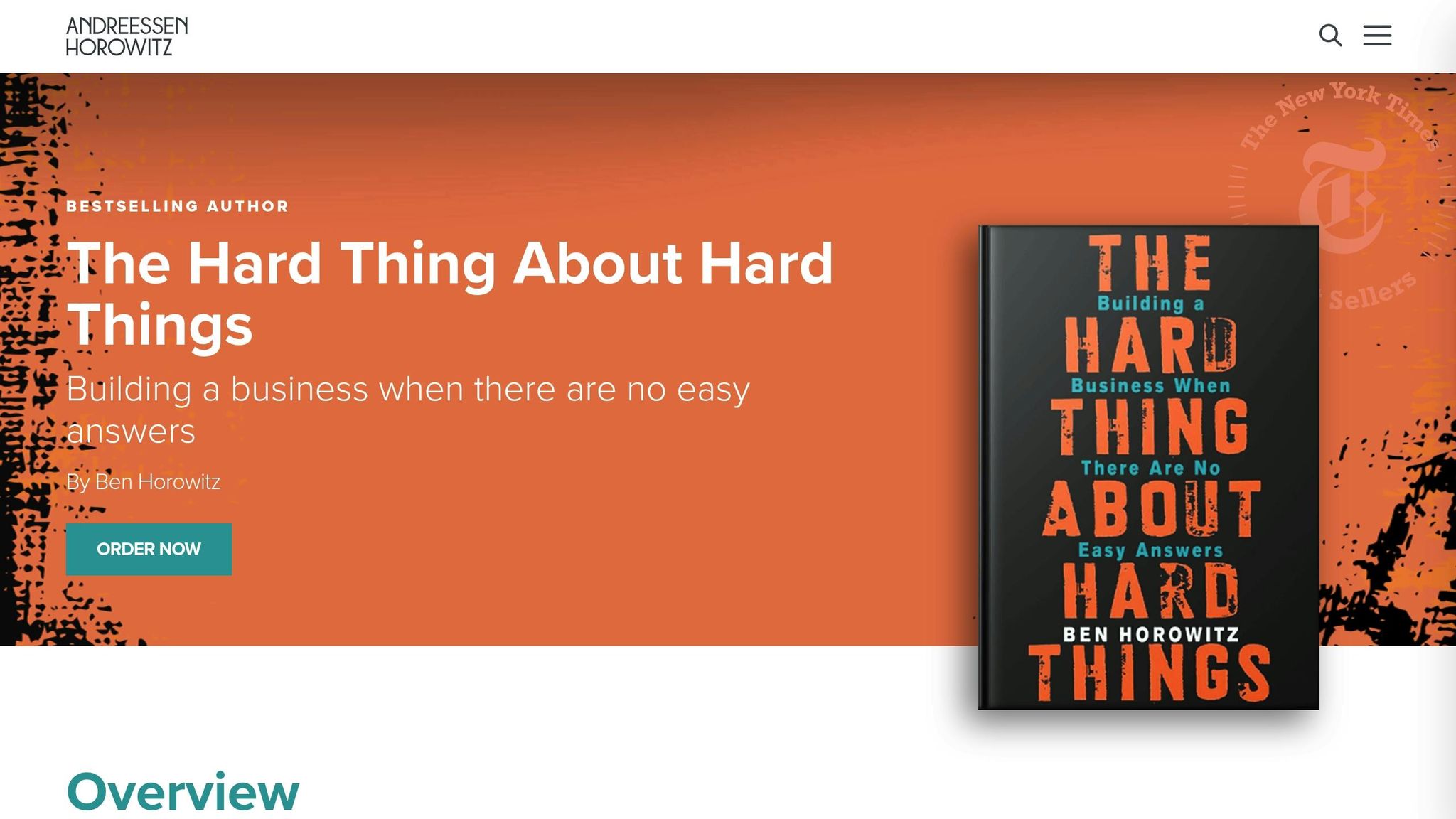
Ben Horowitz's The Hard Thing About Hard Things delivers straightforward advice for entrepreneurs navigating the ups and downs of running a business. Drawing from his own experiences, Horowitz shares how to handle crises and make tough calls with confidence.
One of the book's key ideas is the difference between being a "Peacetime CEO" and a "Wartime CEO." During stable periods, leaders can focus on refining processes and driving growth. But in chaotic or uncertain times, quick, decisive action becomes the priority. This shift in leadership style highlights the need for adaptability and resilience when facing challenges.
Horowitz’s breakdown of these roles offers a practical framework for leaders looking to tackle the complexities of entrepreneurship head-on.
7. Deep Work by Cal Newport
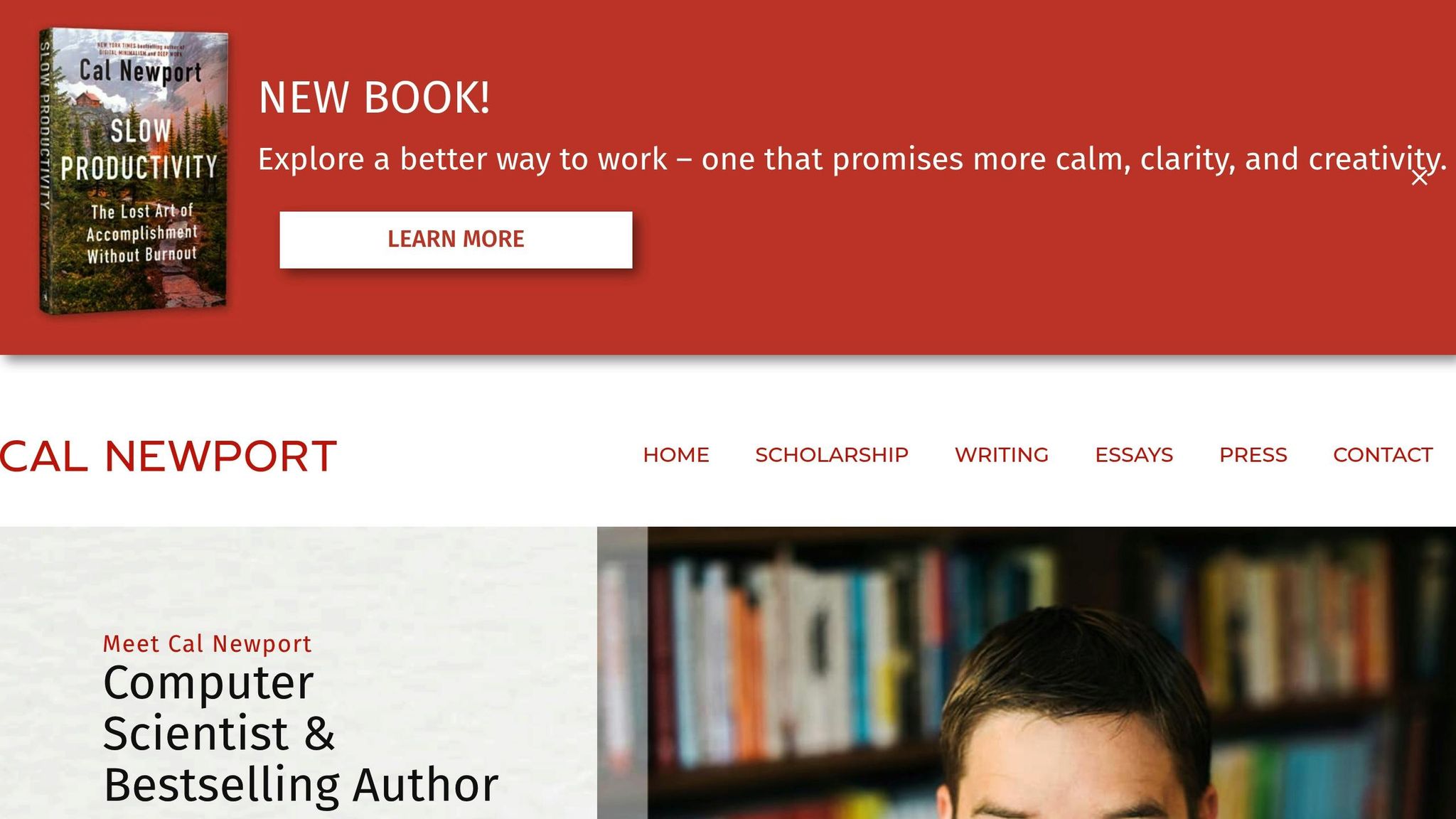
In a world filled with constant distractions, staying focused can feel impossible. Cal Newport's Deep Work lays out a method for achieving intense, distraction-free focus on demanding tasks. This practice not only boosts productivity but also helps develop the mental strength needed to thrive in the long run.
Newport describes deep work as the ability to concentrate fully on challenging tasks without interruptions. By setting aside uninterrupted time for this kind of focus, you can significantly increase your output and build the mental discipline necessary to tackle modern business obstacles.
Sustained focus is a key factor in maintaining resilience over time. This method aligns well with other strategies, emphasizing how deep concentration can help overcome complex challenges in the business world.
Key Lessons and Methods from These Books
These seven books provide strategies to help entrepreneurs build mental toughness in business. They focus on mindset shifts and practical techniques to foster resilience and achieve success. Below, we break down actionable strategies inspired by these works.
Energy Management Over Time Management
Instead of just managing your schedule, focus on managing your energy. In Deep Work, Cal Newport highlights the importance of scheduling focused work during your most productive times. For instance, use peak morning energy for tasks requiring deep concentration. Pair this with regular breaks to maintain focus throughout the day.
Daily Habit Building
James Clear emphasizes the power of small, consistent actions in Atomic Habits. For example, establish habits like morning team reviews with constructive feedback to steadily tackle business challenges and build momentum.
| Mental Toughness Component | Strategy | Outcome |
|---|---|---|
| Focus Management | Plan uninterrupted deep work sessions during peak energy hours | Improved clarity and creativity |
| Energy Optimization | Balance focused work with short, intentional breaks | Consistent performance without burnout |
| Resilience Building | Take on tasks slightly beyond your comfort zone regularly | Better adaptability to challenges |
| Growth Mindset | Reflect on challenges and extract lessons | Smarter decisions and reduced fear of failure |
Strategic Discomfort for Growth
Once strong habits are in place, step outside your comfort zone. Tackle demanding projects, engage in tough client conversations, or make high-pressure decisions. These challenges promote growth and prepare you for future obstacles.
The Growth-Oriented Perspective
Carol Dweck's research underscores the importance of seeing challenges as opportunities. This mindset can turn setbacks into lessons, competition into innovation, and team conflicts into stronger communication. Adopting this outlook is key to building the mental resilience necessary for long-term success.
"Grit is about having stamina, sticking with your future, day in, day out, not just for the week, not just for the month, but for years"
Book Comparison Guide
This guide breaks down how each book approaches building mental resilience and toughness, especially in the context of business challenges.
| Book Title | Core Theme | Target Audience | Key Approach |
|---|---|---|---|
| Can't Hurt Me | Overcoming adversity | Entrepreneurs and individuals facing challenges | Combines personal experiences with actionable lessons |
| Atomic Habits | Habit formation | Professionals aiming for productivity | Emphasizes small, consistent changes |
| The Obstacle Is the Way | Turning challenges into opportunities | Leaders and entrepreneurs | Applies stoic philosophy to modern problems |
| Grit | Passion and perseverance | Students, professionals, and entrepreneurs | Provides research-based insights on persistence |
| Mindset | Growth and fixed mindsets | Anyone seeking personal growth | Examines how mindset influences success |
| The Hard Thing About Hard Things | Navigating tough decisions | Entrepreneurs and business leaders | Offers practical advice from real-world experience |
| Deep Work | Focused productivity | Knowledge workers and professionals | Shares methods for achieving deep, uninterrupted focus |
Each book tackles mental toughness from a different angle. David Goggins' Can't Hurt Me dives into pushing through mental barriers, while Angela Duckworth's Grit highlights the power of perseverance over time. If you're an entrepreneur facing tough decisions, The Hard Thing About Hard Things provides practical, experience-driven guidance. Similarly, The Obstacle Is the Way delivers a structured approach to turning setbacks into opportunities.
For building everyday resilience, Atomic Habits and Deep Work are excellent choices, focusing on productivity and focus. Carol Dweck's Mindset ties it all together by addressing how shifting your beliefs can unlock potential in both personal and professional life.
This guide helps you choose the book that aligns best with your goals, whether you're looking to overcome challenges, improve productivity, or shift your perspective for success.
Wrapping It All Together
Bringing these ideas together provides a practical guide for building mental toughness in business. The books discussed earlier emphasize three main areas: boosting productivity, developing resilience, and shaping a strategic mindset. The key takeaway? Tailor their strategies to fit your unique challenges.
Here’s a quick recap of the main points:
Boosting Productivity:
Books like Deep Work and Atomic Habits focus on improving concentration and creating effective routines. Their methods help entrepreneurs manage their time and energy during high-pressure situations.
Building Resilience:
Can't Hurt Me and Grit encourage leaders to see obstacles as stepping stones, which is essential for bouncing back from setbacks.
Shaping a Strategic Mindset:
The Obstacle Is the Way and Mindset offer fresh perspectives, showing how challenges can drive innovation and growth.
To put these ideas into action:
- Set aside time for deep, focused work
- Develop habits that strengthen your ability to bounce back
- Make clear, confident decisions when faced with tough situations
Mental toughness is about staying calm and focused, even when things don’t go as planned. Whether you’re starting a business, expanding your company, or navigating uncertain times, these strategies can help you stay resilient and adaptable.
The consistent theme here? Resilience is built through deliberate habits and mindset shifts. These books provide tools to help you face challenges head-on and thrive.
FAQs
How does mental toughness help entrepreneurs handle high-pressure business challenges?
Mental toughness empowers entrepreneurs to stay focused and composed in high-stress situations. It enables them to tackle obstacles with confidence, make sound decisions under pressure, and maintain a clear perspective even during setbacks.
By building resilience, entrepreneurs can adapt to unexpected changes, stay motivated through uncertainty, and consistently perform at their best, which is essential for long-term business success.
What are some actionable ways to develop a growth mindset according to Carol S. Dweck's book Mindset?
Carol S. Dweck's book Mindset emphasizes that adopting a growth mindset involves believing that abilities and intelligence can be developed through effort, learning, and persistence. Here are a few practical steps from the book:
- Embrace challenges: View obstacles as opportunities to grow rather than as setbacks.
- Learn from criticism: Use constructive feedback to improve instead of taking it personally.
- Celebrate effort over results: Focus on the process of learning and improvement, not just the outcome.
- Be inspired by others' success: Rather than feeling threatened, see others' achievements as motivation to push yourself further.
By practicing these habits consistently, you can shift your mindset and build resilience for both personal and professional growth.
What strategies does 'Deep Work' by Cal Newport offer for boosting focus and productivity in a world full of distractions?
In Deep Work, Cal Newport emphasizes the importance of cultivating deep focus to achieve meaningful results. He suggests strategies such as setting clear boundaries for work and leisure, minimizing distractions by limiting social media usage, and creating dedicated time blocks for uninterrupted, high-concentration tasks. Newport also advocates for embracing boredom to strengthen your ability to focus and prioritizing tasks that align with your long-term goals. By implementing these practices, you can enhance both productivity and mental clarity in any professional environment.


